The Cambridge History of China. Vol. 12: Republican China, 1912-1949, Part 1
Подождите немного. Документ загружается.

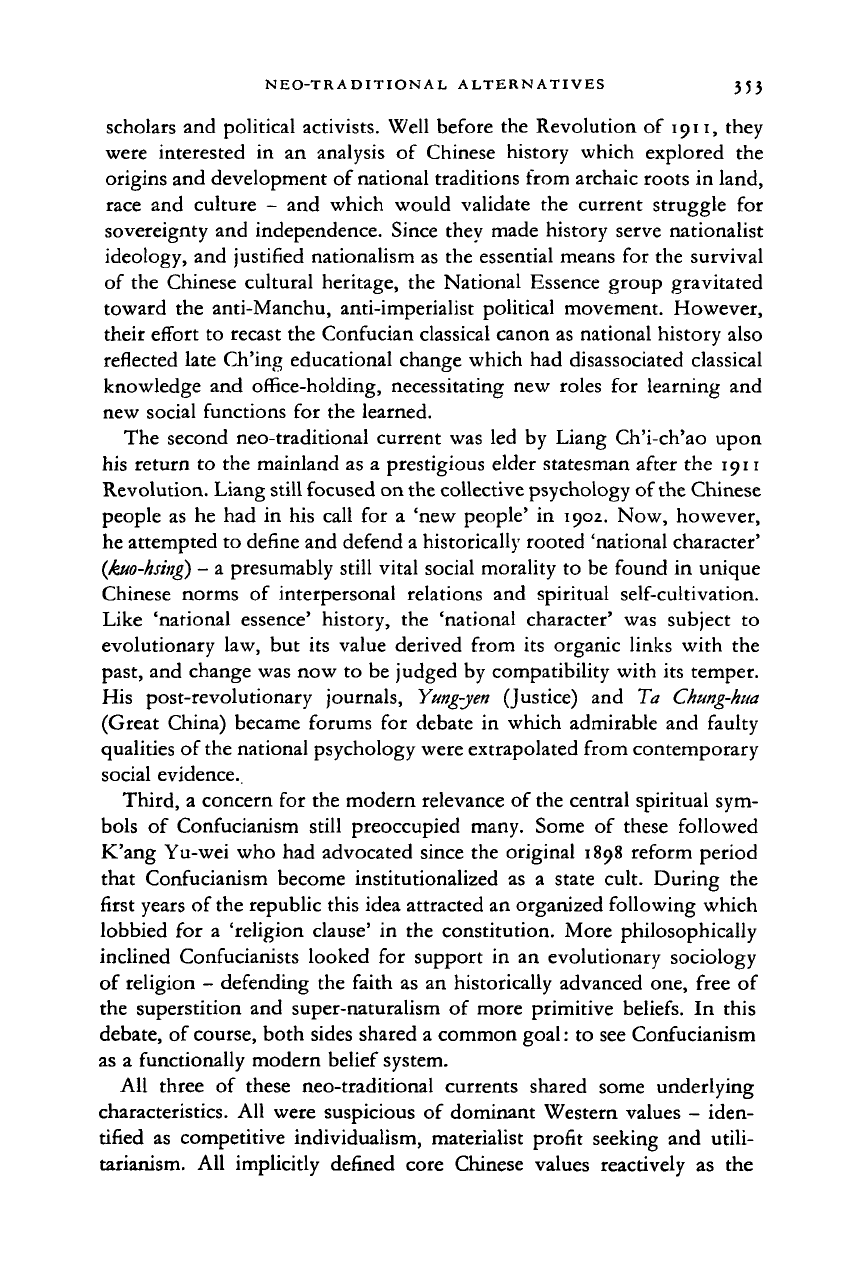
NEO-TRADITIONAL ALTERNATIVES 353
scholars and political activists. Well before the Revolution of 1911, they
were interested in an analysis of Chinese history which explored the
origins and development of national traditions from archaic roots in land,
race and culture - and which would validate the current struggle for
sovereignty and independence. Since they made history serve nationalist
ideology, and justified nationalism as the essential means for the survival
of the Chinese cultural heritage, the National Essence group gravitated
toward the anti-Manchu, anti-imperialist political movement. However,
their effort to recast the Confucian classical canon as national history also
reflected late Ch'ing educational change which had disassociated classical
knowledge and office-holding, necessitating new roles for learning and
new social functions for the learned.
The second neo-traditional current was led by Liang Ch'i-ch'ao upon
his return to the mainland as a prestigious elder statesman after the 1911
Revolution. Liang still focused on the collective psychology of the Chinese
people as he had in his call for a 'new people' in 1902. Now, however,
he attempted to define and defend a historically rooted 'national character'
(Jzuo-hsing)
- a presumably still vital social morality to be found in unique
Chinese norms of interpersonal relations and spiritual self-cultivation.
Like 'national essence' history, the 'national character' was subject to
evolutionary law, but its value derived from its organic links with the
past, and change was now to be judged by compatibility with its temper.
His post-revolutionary journals,
Yung-yen
(Justice) and Ta
Chung-hua
(Great China) became forums for debate in which admirable and faulty
qualities of the national psychology were extrapolated from contemporary
social evidence.
Third, a concern for the modern relevance of the central spiritual sym-
bols of Confucianism still preoccupied many. Some of these followed
K'ang Yu-wei who had advocated since the original 1898 reform period
that Confucianism become institutionalized as a state cult. During the
first years of the republic this idea attracted an organized following which
lobbied for a 'religion clause' in the constitution. More philosophically
inclined Confucianists looked for support in an evolutionary sociology
of religion - defending the faith as an historically advanced one, free of
the superstition and super-naturalism of more primitive beliefs. In this
debate, of course, both sides shared a common goal: to see Confucianism
as a functionally modern belief system.
All three of these neo-traditional currents shared some underlying
characteristics. All were suspicious of dominant Western values - iden-
tified as competitive individualism, materialist profit seeking and utili-
tarianism. All implicitly defined core Chinese values reactively as the
Cambridge Histories Online © Cambridge University Press, 2008
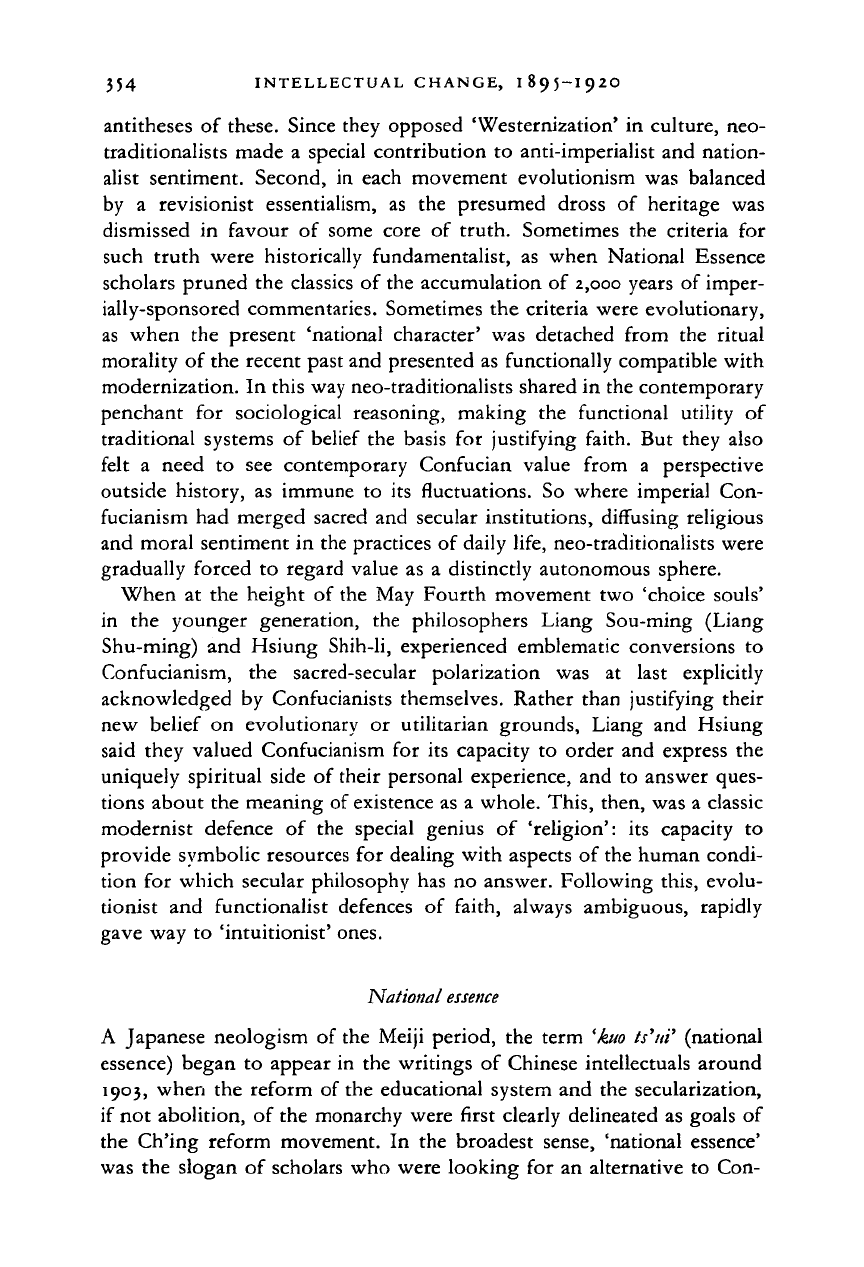
354 INTELLECTUAL CHANGE, 1895-I92O
antitheses of these. Since they opposed 'Westernization' in culture, neo-
traditionalists made a special contribution to anti-imperialist and nation-
alist sentiment. Second, in each movement evolutionism was balanced
by a revisionist essentialism, as the presumed dross of heritage was
dismissed in favour of some core of truth. Sometimes the criteria for
such truth were historically fundamentalist, as when National Essence
scholars pruned the classics of the accumulation of 2,000 years of imper-
ially-sponsored commentaries. Sometimes the criteria were evolutionary,
as when the present 'national character' was detached from the ritual
morality of the recent past and presented as functionally compatible with
modernization. In this way neo-traditionalists shared in the contemporary
penchant for sociological reasoning, making the functional utility of
traditional systems of belief the basis for justifying faith. But they also
felt a need to see contemporary Confucian value from a perspective
outside history, as immune to its fluctuations. So where imperial Con-
fucianism had merged sacred and secular institutions, diffusing religious
and moral sentiment in the practices of daily life, neo-traditionalists were
gradually forced to regard value as a distinctly autonomous sphere.
When at the height of the May Fourth movement two 'choice souls'
in the younger generation, the philosophers Liang Sou-ming (Liang
Shu-ming) and Hsiung Shih-li, experienced emblematic conversions to
Confucianism, the sacred-secular polarization was at last explicitly
acknowledged by Confucianists themselves. Rather than justifying their
new belief on evolutionary or utilitarian grounds, Liang and Hsiung
said they valued Confucianism for its capacity to order and express the
uniquely spiritual side of their personal experience, and to answer ques-
tions about the meaning of existence as a whole. This, then, was a classic
modernist defence of the special genius of 'religion': its capacity to
provide symbolic resources for dealing with aspects of the human condi-
tion for which secular philosophy has no answer. Following this, evolu-
tionist and functionalist defences of faith, always ambiguous, rapidly
gave way to 'intuitionist' ones.
National
essence
A Japanese neologism of the Meiji period, the term 'kuo ts'ni' (national
essence) began to appear in the writings of Chinese intellectuals around
1903,
when the reform of the educational system and the secularization,
if not abolition, of the monarchy were first clearly delineated as goals of
the Ch'ing reform movement. In the broadest sense, 'national essence'
was the slogan of scholars who were looking for an alternative to Con-
Cambridge Histories Online © Cambridge University Press, 2008

NEO-TRADITIONAL ALTERNATIVES
35
5
fucian learning
in the
service
of the
imperial orthodoxy
and
examination
system.'
1
Interest
in a
modern 'national learning'
(kiw-hsueK)
first surfaced
among Chang Chih-tung,
Lo
Chen-yii
and
other central government
bureaucrats
in
charge
of new
educational policies,
who
wanted
to
limit
foreign influence
on
curriculum
and
establish Chinese ethics
as a
stream-
lined department
of
study
in the new
school system.'
2
However, many
classical scholars
saw the
issue as
not
merely
one
of adapting
to new
condi-
tions,
but in a
spirit
of
resistance
to
Western-oriented change, making
the movement
to
'preserve
the
national essence'
a
vehicle
for
militant
nationalists
and
critics
of the
reform movement.
Beginning about
1904
leadership gravitated
to a
clique
of
brilliant
eccentrics
who
found
in
anti-Manchu politics
a
strategy
for
revolution
as
the restoration
of the
spirit
of the
Ming, T'ang
or
even pre-Han
era, and
also
a
rationale
for a
Darwinist influenced historiography glorifying
the
unique
Han
race
and
culture.
The
Association
for the
Preservation
of
Classical Chinese Learning (Kuo-hsueh pao-ts'un
hui),
founded
in
Shanghai
in
January
1905 by
Teng Shih, Huang Chieh
and Liu
Shih-p'ei,
preached anti-Manchu revolution
as an
attractive alternative
to
reform
modernism
and
accommodation with
the
West. Although national essence
advocates acknowledged that
the
West
was a
source
of
world civilization
in
its own
right,
and
that some interrelation between centres
of
civiliza-
tion
was a
necessary pattern
of
world history, much
of
their scholarship,
in fact, appeared motivated
by a
search
for
historically rooted native
alternatives
to the
crumbling imperial Confucian orthodoxy. Here they
drew primarily
on the
Confucian
and
non-Confucian
'one
hundred
schools'
{chu-tzu pai-chia)
of the
classical Chou
era, but
also
on the
Ming
loyalists, Buddhism,
and on the
'knight errant' tradition
of
heroic
vio-
lence." Finally, within
the
movement there
was a
strong undercurrent
of solidarity with China's common people,
who
were like these
neo-
traditionalists
in
being
the
natural victims, rather than beneficiaries,
of
modernization programmes dominated
by the
court
and
provincial elite.
The archaic populist rhetoric
of
secret societies
and
dynastic revolts,
basic
to
anti-Manchu polemic,
was
well suited
to
inspire cultural conserva-
tives
to
support political strategies based
on
violence,
and to
express
sympathy with
the
more backward common people against
the so-
called 'enlightened'
and
pro-Western privileged.'
4
Initial efforts
at
revisionist history
by
'national essence' historians were
31 'Pei-ching ta-hsueh t'ang chih kuo-hsueh wen-t'i' (The problem of national learning at
Peking University),
Hsin-min
ts'mg-pao 34 (July 1903) 61-2.
32
Marianne Bastid, Aspects
de
la
riforme
de
I'enseignement
en
Chine
an
debut
du
2oe slide,
64-5.
33 Furth, Limits of
change,
pt 2,
'National Essence', 57-168.
34
See
Joseph Esherick, Reform and
revolution
in
China: the 1911
Revolution
in
Hunan and Hupeh.
Cambridge Histories Online © Cambridge University Press, 2008

356 INTELLECTUAL CHANGE, 1895-I92O
heavily influenced
by
political anti-Manchuism. Chang Ping-lin's Book
of
raillery,
Liu Shih-p'ei's
Book
of
the expulsion
and Huang Chieh's Yellow
history,
all
published between 1901
and
1906," constituted
a
scholarly
attack on the legitimacy of Manchu rule. All of these works denned the
Chinese nation
(min-tsu)
in terms of racial myth: the presumed common
descent of the Chinese people from the legendary Yellow Emperor (2697-
2597
BC).
The implication was that on racial grounds the Manchus should
be excluded from the national community. These works broke decisively
with canonical tradition by emphasizing the primitive and archaic nature
of the earliest stages
of
Chinese history. Chang and Liu drew upon the
Darwinist sociology
of
Herbert Spencer
for a
comparatively based
evaluation
of
ancient China and other cradle civilizations and so-called
savage peoples. For
a
time they were even impressed with the ideas of
the Belgian Sinologist Terrien de la Couperie, who had posited a common
'cradle' for both Chinese and Middle Eastern antiquity.'
6
Nonetheless, the
strongest single influence upon these works remained the Yellow
book
{Huang
shu)
of
the seventeenth-century Ming loyalist historian, Wang
Fu-chih.
As 'national history', these works transcended their anti-Manchu
polemical purpose. They offered
a
definition
of
the Chinese people as
a
'nation'
{min-tsu)
- an
organic collectivity based upon common ties
of
place, blood, custom and culture. All
of
them pointed
to
some antique
point
of
origin for the complex of national values which might provide
a key
to
the restoration of polity and culture today. Melding Rousseau
and Wang Fu-chih, Liu Shih-p'ei hypothesized that
an
original social
contract between sage ruler and people had led to the creation of unique,
Confucian social and ritual forms
by
the early sage kings. For Chang
Ping-lin, the family system and its formal genealogical lines established
China's racial unity, while language itself concentrated the essence
of
Chinese thought, and legalist statecraft of the Ch'in-Han era had shown
the way
to
serve the needs
of
national wealth and power. None denied
the existence of an evolutionary pattern in history, but as organicists all
stressed origin over development, affirming essential identity over evolu-
tionary continuity between past and present values.
In their message concerning value, 'national essence' scholars had signi-
35 Ch'iu shu (Book of raillery), reprinted in Lo Chia-lun, ed.
Chung-hua
min-kuo
shih-liao
ts'ung
pien (Collection on the history of the Chinese republic); Jang shu (Book of expulsion), first
published 1903, reprinted in Liu
Shen-shu hsien-sheng
i-shu
(Collected works of Mr Liu Shen-
shu [Liu Shih-p'ei]),
1.
762
ff.;
Huang shift (Yellow history), first published
in
Kuo-ts'ui
hsueh-pao
(National essence journal) (190;),
1-9.
36 Selections from
de la
Couperie's Western origins
of
Chinese
civilization were published
in
Hsin-min ts'ung-pao between Sept. 1903 and Jan. 1905.
Cambridge Histories Online © Cambridge University Press, 2008
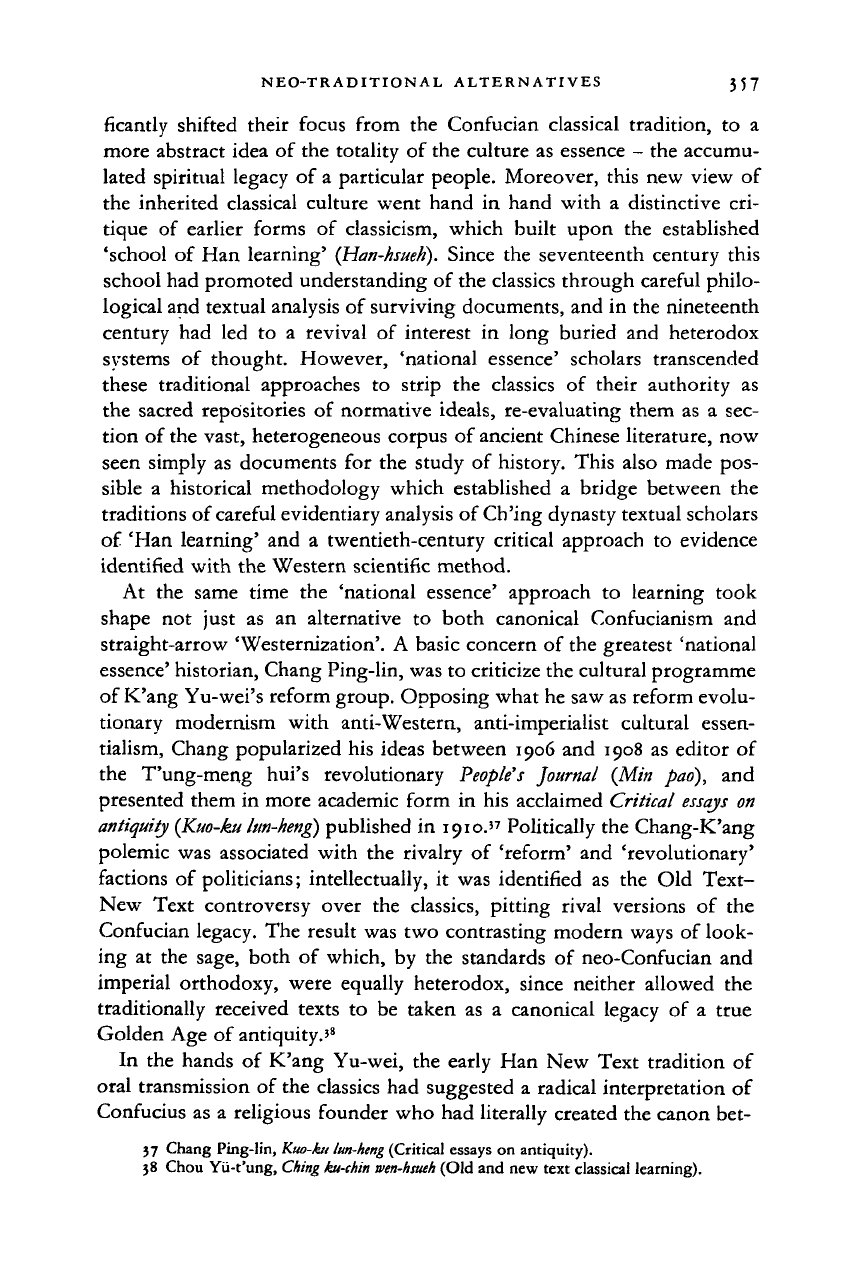
NEO-TRADITIONAL ALTERNATIVES 357
ficantly shifted their focus from
the
Confucian classical tradition,
to a
more abstract idea
of
the totality
of
the culture
as
essence
- the
accumu-
lated spiritual legacy
of a
particular people. Moreover, this
new
view
of
the inherited classical culture went hand
in
hand with
a
distinctive
cri-
tique
of
earlier forms
of
classicism, which built upon
the
established
'school
of
Han learning'
(Han-hsueh).
Since
the
seventeenth century this
school had promoted understanding
of
the classics through careful philo-
logical and textual analysis
of
surviving documents, and
in
the nineteenth
century
had led to a
revival
of
interest
in
long buried
and
heterodox
systems
of
thought. However, 'national essence' scholars transcended
these traditional approaches
to
strip
the
classics
of
their authority
as
the sacred repositories
of
normative ideals, re-evaluating them
as a sec-
tion
of
the vast, heterogeneous corpus
of
ancient Chinese literature,
now
seen simply
as
documents
for the
study
of
history. This also made
pos-
sible
a
historical methodology which established
a
bridge between
the
traditions
of
careful evidentiary analysis
of
Ch'ing dynasty textual scholars
of
'Han
learning'
and a
twentieth-century critical approach
to
evidence
identified with
the
Western scientific method.
At
the
same time
the
'national essence' approach
to
learning took
shape
not
just
as an
alternative
to
both canonical Confucianism
and
straight-arrow 'Westernization'.
A
basic concern
of
the greatest 'national
essence' historian, Chang Ping-lin, was
to
criticize the cultural programme
of K'ang Yu-wei's reform group. Opposing what he saw as reform evolu-
tionary modernism with anti-Western, anti-imperialist cultural essen-
tialism, Chang popularized
his
ideas between 1906
and
1908
as
editor
of
the T'ung-meng hui's revolutionary
People's
Journal
(Min
pao),
and
presented them
in
more academic form
in his
acclaimed Critical
essays
on
antiquity {Kuo-ku lun-heng)
published
in
1910." Politically
the
Chang-K'ang
polemic
was
associated with
the
rivalry
of
'reform'
and
'revolutionary'
factions
of
politicians; intellectually,
it was
identified
as the Old
Text-
New Text controversy over
the
classics, pitting rival versions
of the
Confucian legacy.
The
result was
two
contrasting modern ways
of
look-
ing
at the
sage, both
of
which,
by the
standards
of
neo-Confucian
and
imperial orthodoxy, were equally heterodox, since neither allowed
the
traditionally received texts
to be
taken
as a
canonical legacy
of a
true
Golden Age
of
antiquity.'
8
In
the
hands
of
K'ang Yu-wei,
the
early
Han New
Text tradition
of
oral transmission
of
the classics
had
suggested
a
radical interpretation
of
Confucius
as a
religious founder who had literally created the canon bet-
37 Chang Ping-lin, Kuo-ku
lun-heng
(Critical essays
on
antiquity).
}8 Chou Yii-t'ung, Ching ku-chin
aen-hsueh
(Old and new
text classical learning).
Cambridge Histories Online © Cambridge University Press, 2008
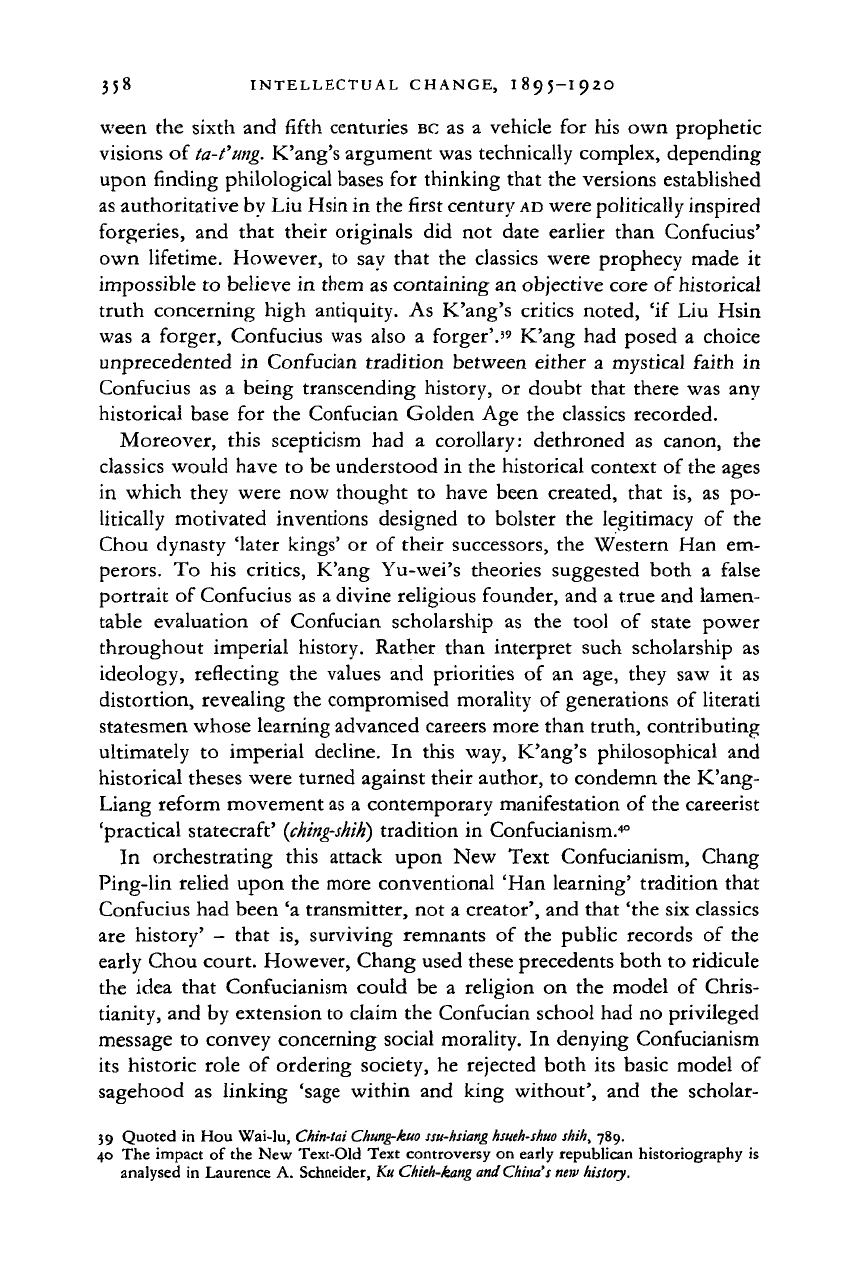
358 INTELLECTUAL CHANGE, 1895-I92O
ween the sixth and fifth centuries
BC
as a vehicle for his own prophetic
visions of
ta-t'ung.
K'ang's argument was technically complex, depending
upon finding philological bases for thinking that the versions established
as authoritative by Liu Hsin in the first century
AD
were politically inspired
forgeries, and that their originals did not date earlier than Confucius'
own lifetime. However, to say that the classics were prophecy made it
impossible to believe in them as containing an objective core of historical
truth concerning high antiquity. As K'ang's critics noted, 'if Liu Hsin
was a forger, Confucius was also a forger'.'
9
K'ang had posed a choice
unprecedented in Confucian tradition between either a mystical faith in
Confucius as a being transcending history, or doubt that there was any
historical base for the Confucian Golden Age the classics recorded.
Moreover, this scepticism had a corollary: dethroned as canon, the
classics would have to be understood in the historical context of the ages
in which they were now thought to have been created, that is, as po-
litically motivated inventions designed to bolster the legitimacy of the
Chou dynasty 'later kings' or of their successors, the Western Han em-
perors. To his critics, K'ang Yu-wei's theories suggested both a false
portrait of Confucius as a divine religious founder, and a true and lamen-
table evaluation of Confucian scholarship as the tool of state power
throughout imperial history. Rather than interpret such scholarship as
ideology, reflecting the values and priorities of an age, they saw it as
distortion, revealing the compromised morality of generations of literati
statesmen whose learning advanced careers more than truth, contributing
ultimately to imperial decline. In this way, K'ang's philosophical and
historical theses were turned against their author, to condemn the K'ang-
Liang reform movement as a contemporary manifestation of the careerist
'practical statecraft'
{ching-shih)
tradition in Confucianism.
40
In orchestrating this attack upon New Text Confucianism, Chang
Ping-lin relied upon the more conventional 'Han learning' tradition that
Confucius had been 'a transmitter, not a creator', and that 'the six classics
are history' - that is, surviving remnants of the public records of the
early Chou court. However, Chang used these precedents both to ridicule
the idea that Confucianism could be a religion on the model of Chris-
tianity, and by extension to claim the Confucian school had no privileged
message to convey concerning social morality. In denying Confucianism
its historic role of ordering society, he rejected both its basic model of
sagehood as linking 'sage within and king without', and the scholar-
39 Quoted in Hou Wai-lu,
Chin-tai
Chung-kuo
ssu-hsiang hsueh-shuo
shih, 789.
40 The impact of the New Text-Old Text controversy on early republican historiography is
analysed in Laurence A. Schneider, Kit Chieh-kang and
China's new
history.
Cambridge Histories Online © Cambridge University Press, 2008
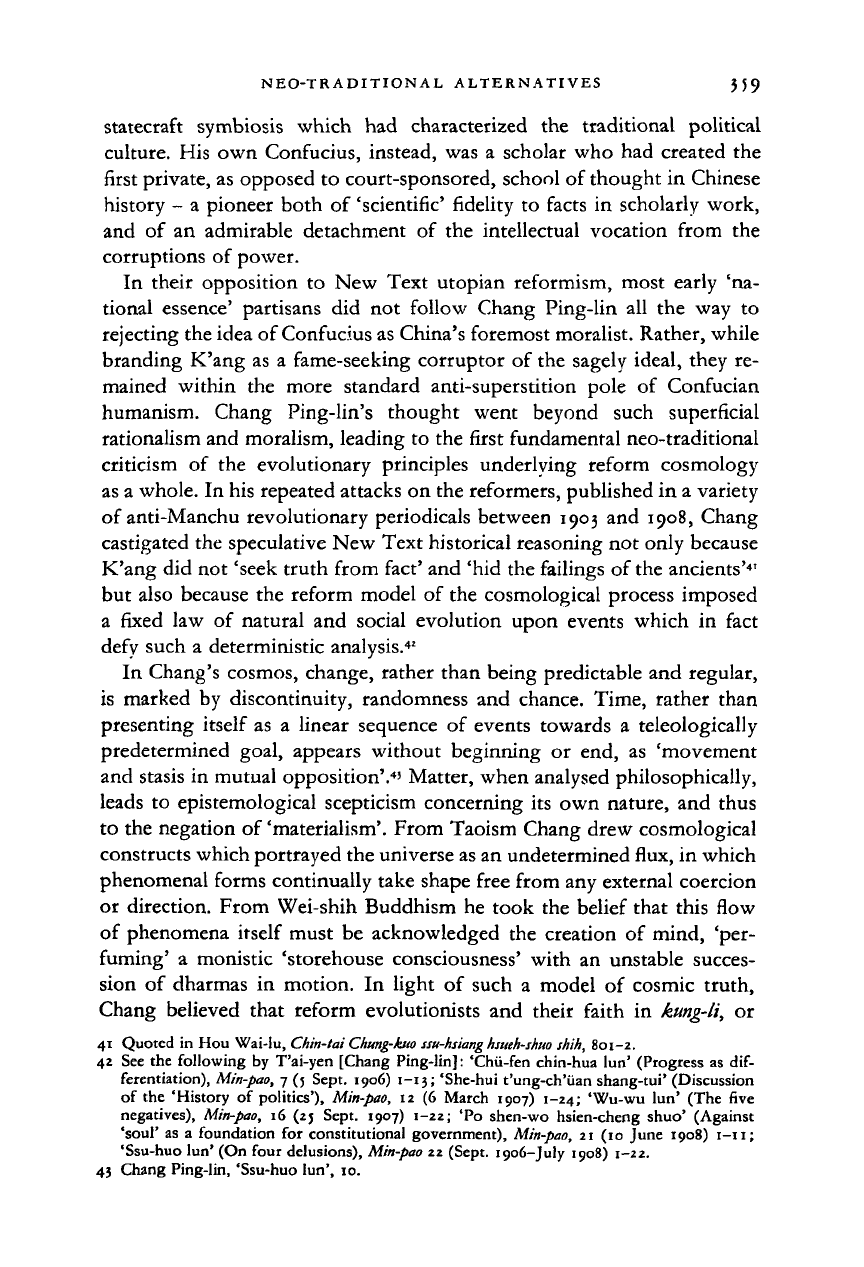
NEO-TRADITIONAL ALTERNATIVES
359
statecraft symbiosis which
had
characterized
the
traditional political
culture.
His own
Confucius, instead,
was a
scholar
who had
created
the
first private,
as
opposed
to
court-sponsored, school
of
thought
in
Chinese
history
- a
pioneer both
of
'scientific' fidelity
to
facts
in
scholarly work,
and
of an
admirable detachment
of the
intellectual vocation from
the
corruptions
of
power.
In their opposition
to New
Text Utopian reformism, most early
'na-
tional essence' partisans
did not
follow Chang Ping-lin
all the way to
rejecting
the
idea
of
Confucius as China's foremost moralist. Rather, while
branding K'ang
as a
fame-seeking corruptor
of the
sagely ideal, they
re-
mained within
the
more standard anti-superstition pole
of
Confucian
humanism. Chang Ping-lin's thought went beyond such superficial
rationalism
and
moralism, leading
to the
first fundamental neo-traditional
criticism
of the
evolutionary principles underlying reform cosmology
as
a
whole.
In his
repeated attacks
on the
reformers, published
in a
variety
of anti-Manchu revolutionary periodicals between
1903 and 1908,
Chang
castigated
the
speculative
New
Text historical reasoning
not
only because
K'ang
did not
'seek truth from fact'
and 'hid the
failings
of
the ancients'
41
but also because
the
reform model
of the
cosmological process imposed
a fixed
law of
natural
and
social evolution upon events which
in
fact
defy such
a
deterministic analysis.
42
In Chang's cosmos, change, rather than being predictable
and
regular,
is marked
by
discontinuity, randomness
and
chance. Time, rather than
presenting itself
as a
linear sequence
of
events towards
a
teleologically
predetermined goal, appears without beginning
or end, as
'movement
and stasis
in
mutual opposition'.
45
Matter, when analysed philosophically,
leads
to
epistemological scepticism concerning
its own
nature,
and
thus
to
the
negation
of
'materialism'. From Taoism Chang drew cosmological
constructs which portrayed
the
universe as
an
undetermined flux,
in
which
phenomenal forms continually take shape free from
any
external coercion
or direction. From Wei-shih Buddhism
he
took
the
belief that this flow
of phenomena itself must
be
acknowledged
the
creation
of
mind,
'per-
fuming'
a
monistic 'storehouse consciousness' with
an
unstable succes-
sion
of
dharmas
in
motion.
In
light
of
such
a
model
of
cosmic truth,
Chang believed that reform evolutionists
and
their faith
in
kung-li,
or
41 Quoted in Hou Wai-lu,
Chin-tai Chung-kuo ssu-hsiang hsueh-shuo
shih,
801-2.
42 See the following by T'ai-yen [Chang Ping-lin]: 'Chii-fen chin-hua lun' (Progress as dif-
ferentiation),
Min-pao,
7 (5 Sept. 1906) 1-13; 'She-hui t'ung-ch'iian shang-tui' (Discussion
of the 'History of polities'), Min-pao, 12 (6 March 1907) 1-24; 'Wu-wu lun' (The five
negatives), Min-pao, 16 (25 Sept. 1907) 1-22; 'Po shen-wo hsien-cheng shuo' (Against
'soul' as a foundation for constitutional government), Min-pao, 21 (10 June 1908) 1-11;
'Ssu-huo lun' (On four delusions),
Min-pao
22 (Sept. 1906-July 1908) 1-22.
43 Chang Ping-lin, 'Ssu-huo lun', 10.
Cambridge Histories Online © Cambridge University Press, 2008
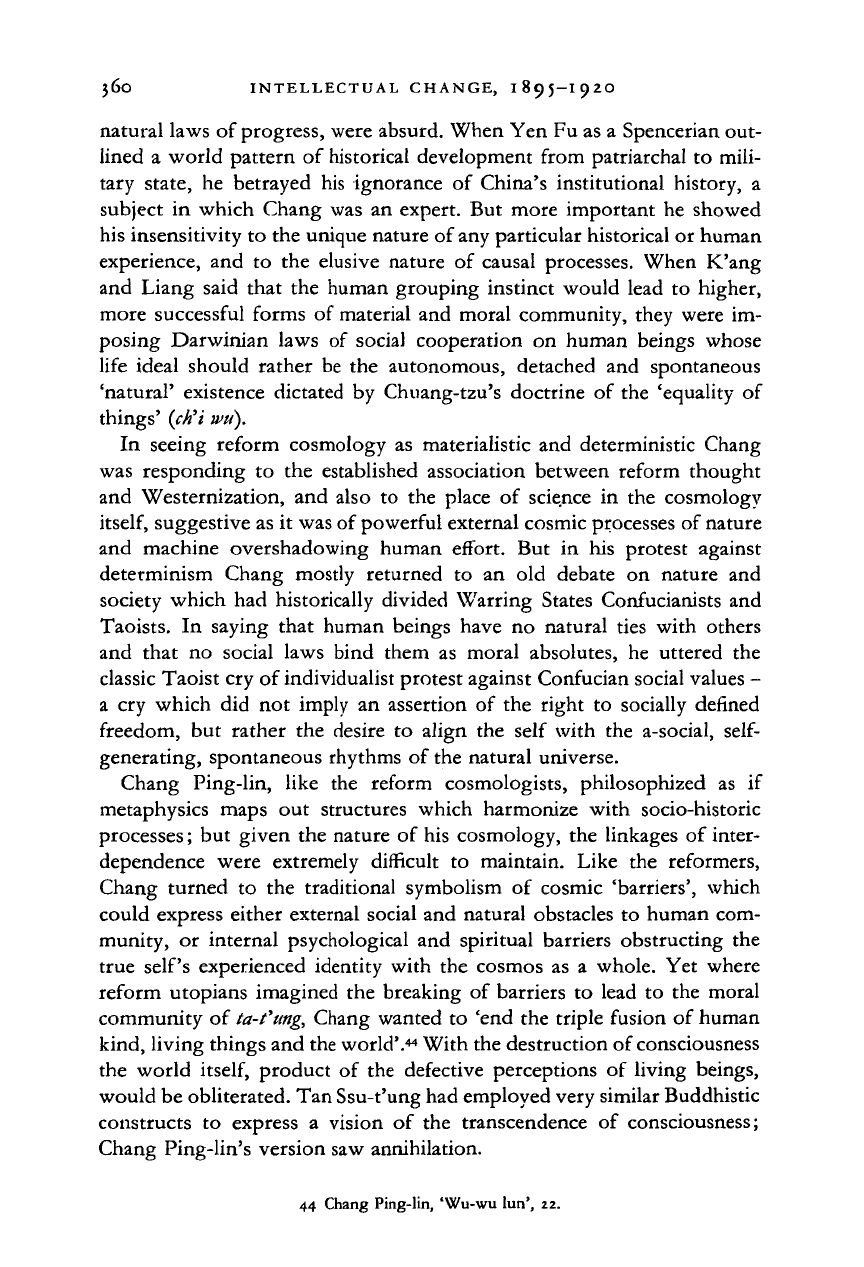
360 INTELLECTUAL CHANGE, 1895-I92O
natural laws
of
progress, were absurd. When Yen Fu as
a
Spencerian out-
lined
a
world pattern
of
historical development from patriarchal
to
mili-
tary state,
he
betrayed
his
ignorance
of
China's institutional history,
a
subject
in
which Chang was
an
expert.
But
more important
he
showed
his insensitivity
to
the unique nature of any particular historical
or
human
experience,
and to the
elusive nature
of
causal processes. When K'ang
and Liang said that
the
human grouping instinct would lead
to
higher,
more successful forms
of
material
and
moral community, they were
im-
posing Darwinian laws
of
social cooperation
on
human beings whose
life ideal should rather
be the
autonomous, detached
and
spontaneous
'natural' existence dictated
by
Chuang-tzu's doctrine
of
the 'equality
of
things'
(ch'i
wu).
In seeing reform cosmology
as
materialistic
and
deterministic Chang
was responding
to the
established association between reform thought
and Westernization,
and
also
to the
place
of
science
in the
cosmology
itself,
suggestive as
it
was
of
powerful external cosmic processes
of
nature
and machine overshadowing human effort.
But in his
protest against
determinism Chang mostly returned
to an old
debate
on
nature
and
society which
had
historically divided Warring States Confucianists
and
Taoists.
In
saying that human beings have
no
natural ties with others
and that
no
social laws bind them
as
moral absolutes,
he
uttered
the
classic Taoist cry
of
individualist protest against Confucian social values
-
a
cry
which
did not
imply
an
assertion
of
the right
to
socially defined
freedom,
but
rather
the
desire
to
align
the
self with
the
a-social,
self-
generating, spontaneous rhythms
of
the natural universe.
Chang Ping-lin, like
the
reform cosmologists, philosophized
as if
metaphysics maps
out
structures which harmonize with socio-historic
processes;
but
given
the
nature
of
his cosmology,
the
linkages
of
inter-
dependence were extremely difficult
to
maintain. Like
the
reformers,
Chang turned
to the
traditional symbolism
of
cosmic 'barriers', which
could express either external social and natural obstacles
to
human com-
munity,
or
internal psychological
and
spiritual barriers obstructing
the
true self's experienced identity with
the
cosmos
as a
whole.
Yet
where
reform Utopians imagined
the
breaking
of
barriers
to
lead
to the
moral
community
of
ta-t'ung,
Chang wanted
to
'end the triple fusion
of
human
kind, living things and the world'.
44
With the destruction of consciousness
the world
itself,
product
of the
defective perceptions
of
living beings,
would be obliterated. Tan Ssu-t'ung had employed very similar Buddhistic
constructs
to
express
a
vision
of the
transcendence
of
consciousness;
Chang Ping-lin's version saw annihilation.
44 Chang Ping-lin, 'Wu-wu lun', 22.
Cambridge Histories Online © Cambridge University Press, 2008
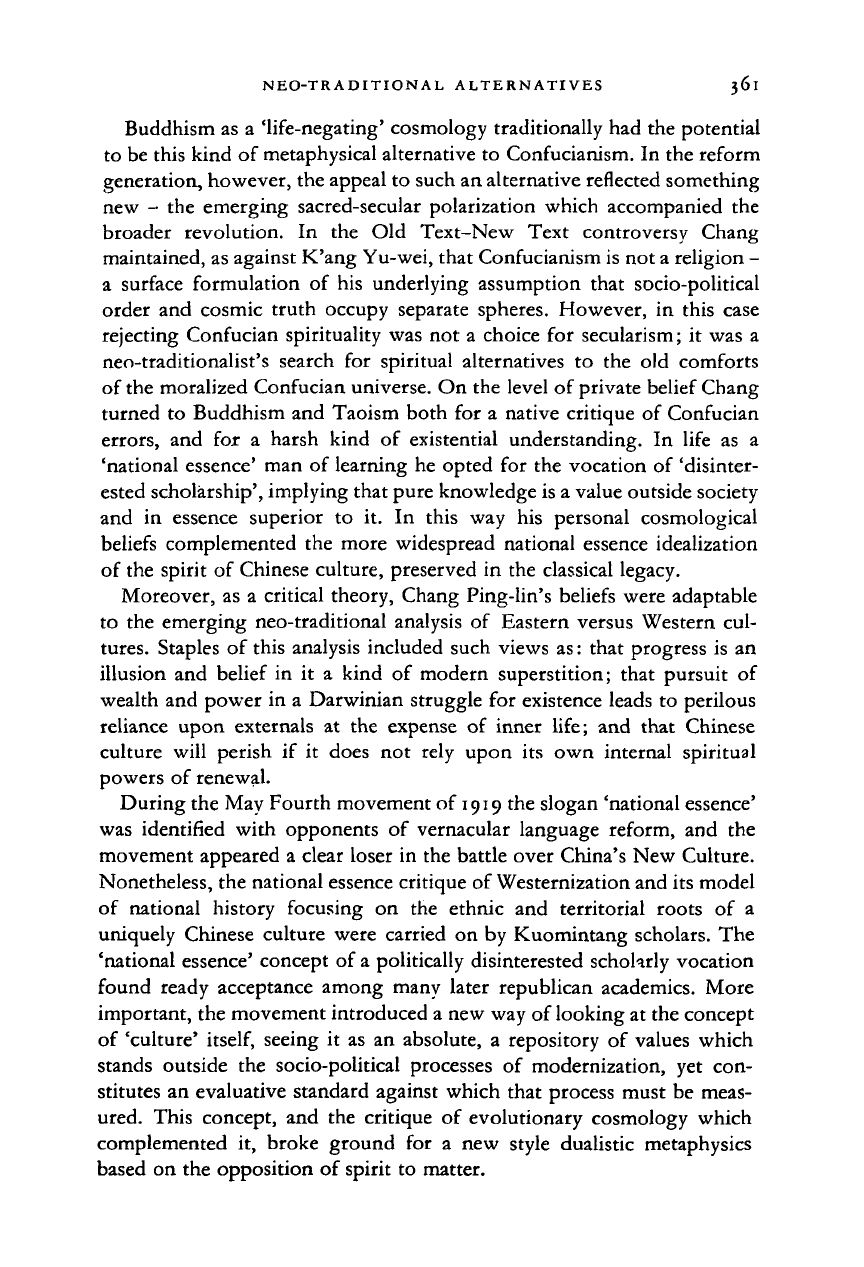
NEO-TRADITIONAL ALTERNATIVES 361
Buddhism as
a
'life-negating' cosmology traditionally had the potential
to be this kind of metaphysical alternative to Confucianism. In the reform
generation, however, the appeal to such an alternative reflected something
new
-
the emerging sacred-secular polarization which accompanied
the
broader revolution.
In the Old
Text-New Text controversy Chang
maintained, as against K'ang Yu-wei, that Confucianism is not a religion
-
a surface formulation
of
his underlying assumption that socio-political
order and cosmic truth occupy separate spheres. However,
in
this case
rejecting Confucian spirituality was not
a
choice
for
secularism;
it
was
a
neo-traditionalist's search
for
spiritual alternatives
to the old
comforts
of the moralized Confucian universe. On the level of private belief Chang
turned
to
Buddhism and Taoism both for
a
native critique
of
Confucian
errors,
and for a
harsh kind
of
existential understanding.
In
life
as a
'national essence' man
of
learning he opted
for
the vocation
of
'disinter-
ested scholarship', implying that pure knowledge is a value outside society
and
in
essence superior
to it. In
this
way his
personal cosmological
beliefs complemented the more widespread national essence idealization
of the spirit
of
Chinese culture, preserved
in
the classical legacy.
Moreover, as
a
critical theory, Chang Ping-lin's beliefs were adaptable
to the emerging neo-traditional analysis
of
Eastern versus Western cul-
tures.
Staples
of
this analysis included such views as: that progress
is an
illusion and belief
in it a
kind
of
modern superstition; that pursuit
of
wealth and power in a Darwinian struggle for existence leads to perilous
reliance upon externals
at the
expense
of
inner life;
and
that Chinese
culture will perish
if it
does
not
rely upon
its
own internal spiritual
powers of renewal.
During the May Fourth movement
of
1919 the slogan 'national essence'
was identified with opponents
of
vernacular language reform,
and the
movement appeared
a
clear loser in the battle over China's New Culture.
Nonetheless, the national essence critique of Westernization and its model
of national history focusing
on the
ethnic
and
territorial roots
of a
uniquely Chinese culture were carried on by Kuomintang scholars. The
'national essence' concept of a politically disinterested schohrly vocation
found ready acceptance among many later republican academics. More
important, the movement introduced a new way of looking at the concept
of 'culture'
itself,
seeing
it
as
an
absolute,
a
repository
of
values which
stands outside
the
socio-political processes
of
modernization,
yet
con-
stitutes an evaluative standard against which that process must be meas-
ured. This concept, and the critique
of
evolutionary cosmology which
complemented
it,
broke ground
for a
new style dualistic metaphysics
based on the opposition
of
spirit to matter.
Cambridge Histories Online © Cambridge University Press, 2008
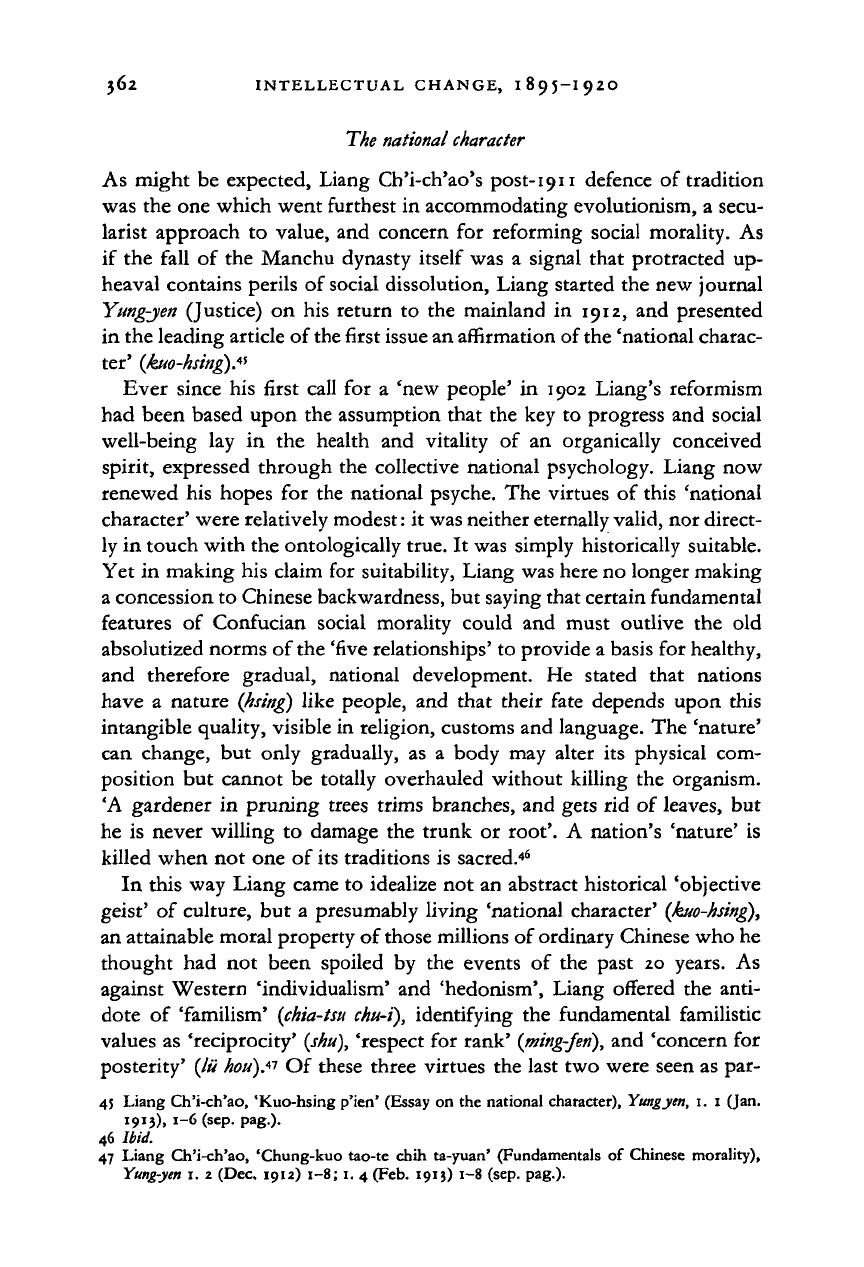
362 INTELLECTUAL CHANGE, 1895-I92O
The national
character
As might be expected, Liang Ch'i-ch'ao's post-1911 defence
of
tradition
was the one which went furthest in accommodating evolutionism, a secu-
larist approach
to
value, and concern
for
reforming social morality.
As
if the fall
of
the Manchu dynasty itself was
a
signal that protracted up-
heaval contains perils of social dissolution, Liang started the new journal
Yung-yen
(Justice)
on
his return
to
the mainland
in
1912, and presented
in the leading article of
the
first issue an affirmation of the 'national charac-
ter' (kuo-hsing)*
Ever since his first call
for a
'new people'
in
1902 Liang's reformism
had been based upon the assumption that the key to progress and social
well-being
lay in the
health
and
vitality
of an
organically conceived
spirit, expressed through the collective national psychology. Liang now
renewed his hopes
for
the national psyche. The virtues
of
this 'national
character' were relatively modest: it was neither eternally valid, nor direct-
ly in touch with the ontologically true.
It
was simply historically suitable.
Yet in making his claim for suitability, Liang was here no longer making
a concession to Chinese backwardness, but saying that certain fundamental
features
of
Confucian social morality could
and
must outlive
the old
absolutized norms of the 'five relationships' to provide a basis for healthy,
and therefore gradual, national development.
He
stated that nations
have
a
nature
{hsing)
like people, and that their fate depends upon this
intangible quality, visible in religion, customs and language. The 'nature'
can change,
but
only gradually,
as a
body may alter
its
physical com-
position but cannot be totally overhauled without killing the organism.
'A gardener
in
pruning trees trims branches, and gets rid
of
leaves, but
he
is
never willing
to
damage the trunk
or
root'.
A
nation's 'nature'
is
killed when not one of its traditions is sacred.
46
In this way Liang came to idealize not an abstract historical 'objective
geist'
of
culture, but
a
presumably living 'national character'
(kuo-hsing),
an attainable moral property of those millions of ordinary Chinese who he
thought
had not
been spoiled
by the
events
of
the past
20
years.
As
against Western 'individualism' and 'hedonism', Liang offered the anti-
dote
of
'familism'
(chia-tsu
chu-i),
identifying the fundamental familistic
values as 'reciprocity'
(shu),
'respect for rank'
(ming-fen),
and 'concern for
posterity' (lii
hou).*i
Of
these three virtues the last two were seen as par-
45 Liang Ch'i-ch'ao, 'Kuo-hsing p'ien' (Essay on the national character), Yungyen,
1. 1
(Jan.
1913),
1-6 (sep. pag.).
46
Ibid.
47 Liang Ch'i-ch'ao, 'Chung-kuo tao-te chih ta-yuan' (Fundamentals
of
Chinese morality),
Yung-yen
i. 2
(Dec. 1912) 1-8; 1.
4
(Feb. 1913) 1-8 (sep. pag.)-
Cambridge Histories Online © Cambridge University Press, 2008
